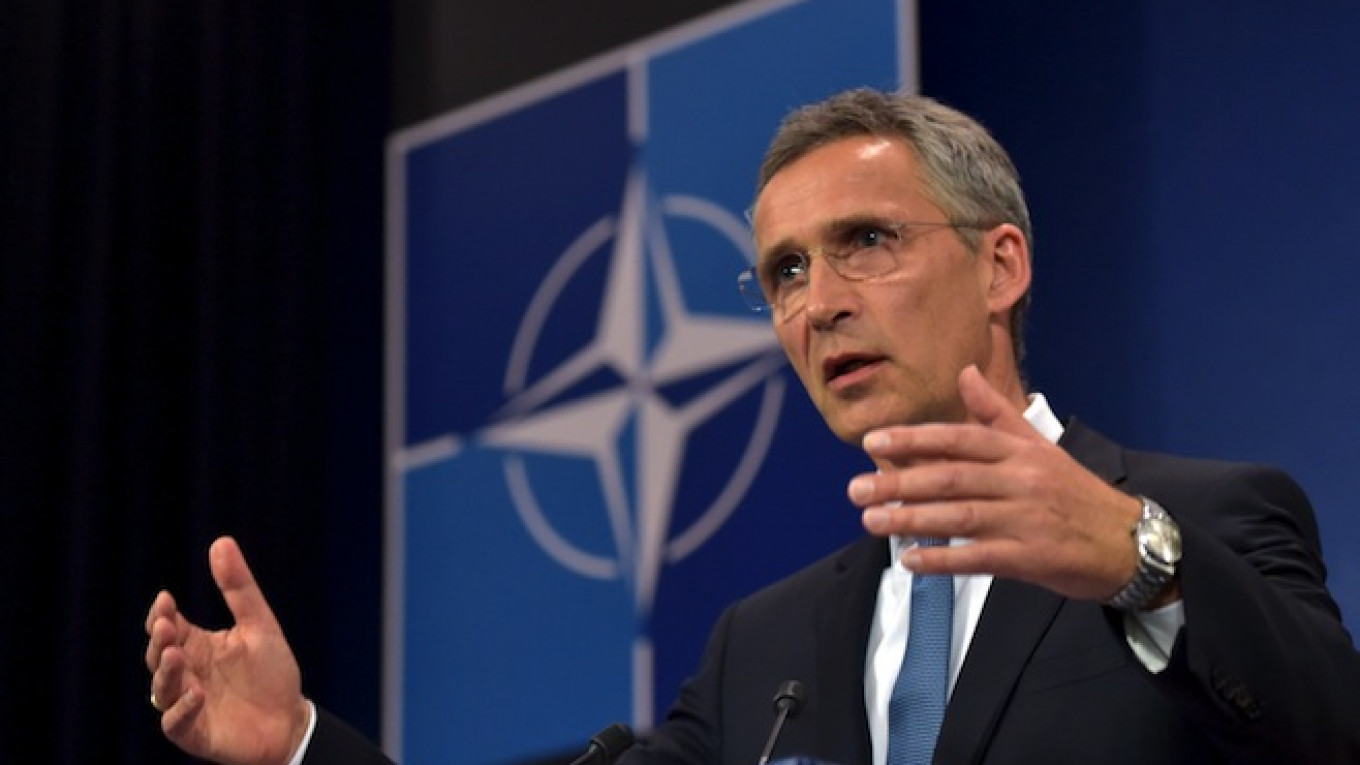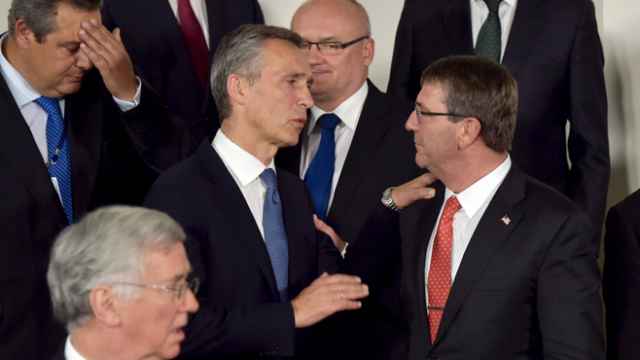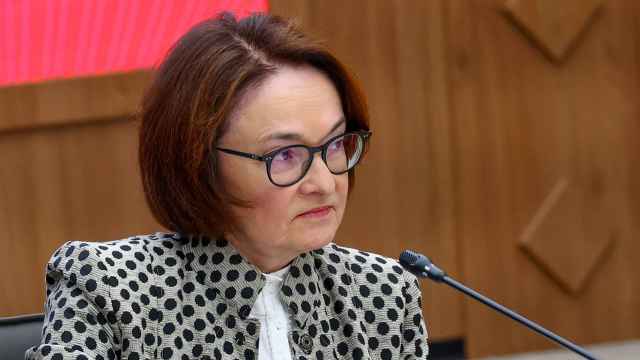BRUSSELS — NATO is preparing for a long standoff with Russia, reluctantly accepting that the Ukraine conflict has fundamentally transformed Europe's security landscape and that it may have to abandon hope of a constructive relationship with Moscow.
Some NATO allies, anxious to avoid a new Cold War or being dragged into an expensive arms race, had hoped the crisis in relations caused by President Vladimir Putin's annexation of Ukraine's Crimea region last year would blow over quickly, just as a chill over Russia's 2008 war with Georgia did.
But realization is dawning at NATO headquarters that that is not going to happen and that relations with Russia have entered a new frosty period that could last a long time, possibly requiring a formal change in the alliance's doctrine.
Both sides have escalated their rhetoric over eastern Ukraine, where the U.S.-dominated, 28-nation alliance accuses Russia of sending in troops to back pro-Russian separatists — charges denied by Moscow.
The tension has prompted debate about whether it is time to rewrite NATO's master strategy document, designed at a time when there were high hopes that the enmity of the Cold War years could be set aside and Russia and NATO could work together.
The "strategic concept", adopted by NATO leaders at a Lisbon summit in 2010, rates the threat of a conventional attack on NATO territory as low.
The document, which sets out the alliance's goals and missions, says NATO-Russia cooperation is of strategic importance and adds: "We want to see a true strategic partnership between NATO and Russia."
"Some of the language (in the document) having to do with Russia as a strategic partner of the alliance is certainly cast into question given Russia's behavior," U.S. Ambassador to NATO Douglas Lute told reporters last month, though he said no decision had yet been taken to revise it.
Existential Challenge
NATO staff are drawing up more detailed contingency plans for various secret scenarios and war in Europe is no longer seen as completely out of the question.
Whereas NATO has in recent years been able to choose whether to get involved in conflicts such as in Afghanistan or Libya, in future it "could be forced to respond to an existential challenge," a NATO diplomat said.
Under NATO's founding treaty, member states are obliged to treat an attack on any partner as an attack on the entire bloc.
Lithuanian Defense Minister Juozas Olekas said NATO had to adapt to a new security environment and rewriting the 35-page strategy document was "one of the options".
"Today Russia is a threat for us," he told Reuters on the sidelines of a NATO meeting in Brussels last month, adding that the alliance had not closed the door to possible future cooperation but Russia must respect international law.
Lithuania is one of three Baltic states that declared independence from the Soviet Union in 1990 or 1991, joined NATO in 2004, and feel particularly threatened by Russia's behavior in Ukraine and by its increased military activity in the skies and seas around NATO's borders. Lithuania, like the other Baltic states, has an ethnic Russian minority.
An announcement by the Russian prosecutor-general's office last week that it would review a 1991 Soviet decision to recognize their independence caused alarm in the Baltic states, though the Kremlin sought to play down its significance.
The NATO diplomat, speaking on condition of anonymity, said there was little argument that the strategy document was out of date and would have to be rewritten "reasonably soon".
The chill in relations with Russia would be lasting because Putin's survival in power "is linked to permanent confrontation with the West," the diplomat said.
But some allies, including Germany, are reluctant to change the strategy document now, partly because it would entail about a year's work and partly because they do not want to antagonize Russia by closing the door on cooperation, or take any step that could undermine a truce agreement in Ukraine, the diplomat said.
Nikolai Patrushev, head of the Kremlin's Security Council, accused the West on Friday of seeking to change Russia's leadership.
Pandora's Box
Diplomats worry that rewriting the strategic concept could open a Pandora's box, with some southern NATO allies, which think the alliance concentrates too much on security challenges from the east, wanting a greater focus on new threats from the south, such as the Islamic State group based in Syria and Iraq.
"It would stimulate a fundamental review of European security, of our approach to the south," one NATO official, also speaking on condition of anonymity, said.
Removing the aspiration of a strategic partnership with Russia from the text would be "a big political step and maybe not necessary", the official said.
NATO seems likely to opt for compromise. NATO leaders could order work on a revamp of the strategy document when they meet in Warsaw next July. It would then be ready for approval when they next meet, probably in 2018, diplomats said.
NATO's "strategic concept" has been rewritten in the past after watershed changes in security, such as the fall of the Berlin Wall or the September 11, 2001 attacks on U.S. cities.
The 2010 version was conceived when NATO's major operation was in Afghanistan. Since the end of NATO combat operations there and the outbreak of the Ukraine crisis, NATO's focus has returned squarely to defending its own territory.
Moving to reassure eastern European allies that feel threatened by Russia's actions, NATO has increased air patrols and troop rotations in the Baltics, stepped up exercises and is creating a rapid reaction force. Moscow portrays NATO action as provocative and denies any intention on its part to intimidate.
After the annexation of Crimea, NATO suspended practical cooperation with Russia, which had ranged from maintaining Afghan army helicopters to counter-terrorism and combating piracy off Somalia.
The overthrow of Ukraine's former pro-Russian president, Viktor Yanukovych, last year, applauded in the West, deepened Moscow's suspicions about NATO encroachment in its backyard.
Last December, Putin, hit by Western sanctions over Russia's actions in Ukraine, signed a new military doctrine that named NATO expansion among key external risks.
Russia last week denounced a new U.S. military strategy that accused Moscow of failing to respect its neighbors' sovereignty as "confrontational."
The Russian Defense Ministry did not respond to a request for comment on a possible change in the NATO strategy document.
Ruslan Pukhov, director of the Centre for Analysis of Strategies and Technologies in Moscow, said Russia would react negatively to a change in the NATO strategy document.
"Since the collapse of the Soviet Union, NATO has been searching for a raison d'être ... Now NATO, and especially (the) military staff, are relieved that they can return to the good old times," he told Reuters.
Alexander Golts, defense columnist and deputy editor of online newspaper Yezhednevny Zhurnal, said he was very pessimistic about future Russia-NATO relations.
"We are moving very rapidly to start a new Cold War," he said.
A Message from The Moscow Times:
Dear readers,
We are facing unprecedented challenges. Russia's Prosecutor General's Office has designated The Moscow Times as an "undesirable" organization, criminalizing our work and putting our staff at risk of prosecution. This follows our earlier unjust labeling as a "foreign agent."
These actions are direct attempts to silence independent journalism in Russia. The authorities claim our work "discredits the decisions of the Russian leadership." We see things differently: we strive to provide accurate, unbiased reporting on Russia.
We, the journalists of The Moscow Times, refuse to be silenced. But to continue our work, we need your help.
Your support, no matter how small, makes a world of difference. If you can, please support us monthly starting from just $2. It's quick to set up, and every contribution makes a significant impact.
By supporting The Moscow Times, you're defending open, independent journalism in the face of repression. Thank you for standing with us.
Remind me later.






